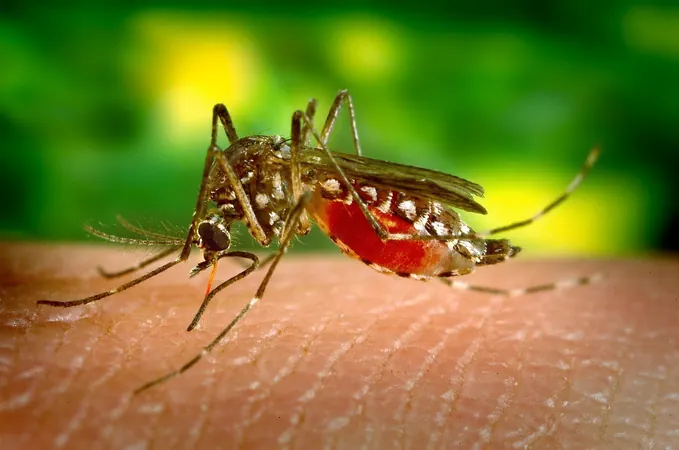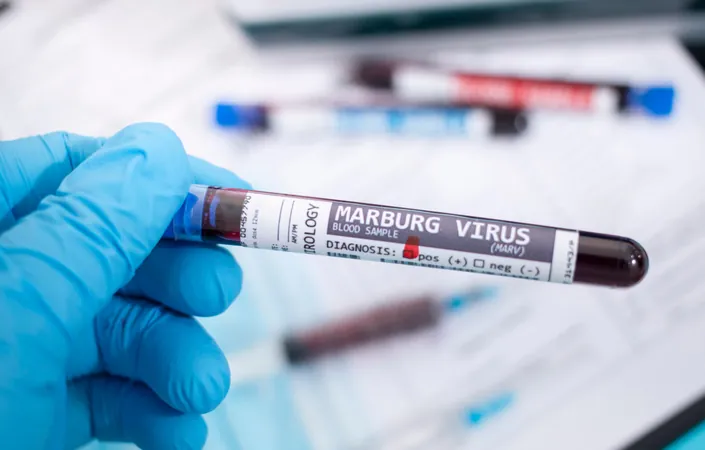
Unexpected Rise of 'Odyssean Malaria' in Europe: Are We Safe from Mosquito-Borne Diseases?
2024-10-10
Author: Jia
Unexpected Rise of "Odyssean Malaria" in Europe: Are We Safe from Mosquito-Borne Diseases?
In a shocking revelation, a surge in malaria cases attributed to mosquitoes transported via air travel, luggage, and parcels has been reported in Europe. A recent retrospective analysis from France, combined with a systematic review published in the journal Eurosurveillance, indicates that these imported cases, termed "Odyssean malaria," are becoming a significant concern for public health across the continent.
After a successful battle that eradicated malaria from Western Europe in the 1970s, travelers returning from malaria-endemic regions have primarily driven the malaria cases reported in the EU/EEA. Alarmingly, of the 6,131 malaria cases reported in 2022 alone, a staggering 99% were travel-related.
However, "Odyssean malaria" refers specifically to instances where an infected mosquito hitches a ride across borders, resulting in transmission within local communities. This phenomenon includes airport malaria—where infection occurs in or around airports—luggage malaria, and sporadic locally-acquired cases. The analysis conducted highlighted 145 cases across nine countries, with France, Belgium, and Germany reporting the highest numbers. Not surprisingly, nearly half of these cases were linked to individuals residing or working close to international airports.
Key Findings from Recent Research
The systematic review evaluated data spanning from 1969 to January 2024, drawing information from numerous health databases and a targeted data collection from EU/EEA and UK public health authorities launched in 2022. The findings were unsettling: among the cases tallied, 105 were categorized as airport malaria, 32 as luggage malaria, while the remaining were indeterminate. This rising trend is notable even against the backdrop of declining air traffic during the COVID-19 pandemic.
Demographically, those infected with malaria had an average age of 37.9 years, with a notable prevalence among males, who outnumbered females at a ratio of 1.5:1. Out of the known outcomes, while 124 recovered, nine tragically succumbed to the disease. The average age of these fatalities was 57.2 years, spotlighting the vulnerability of older individuals.
Historical Patterns of Local Malaria in France
A parallel retrospective analysis examining locally-acquired malaria in France from 1995 to 2022 reinforced these trends, revealing 117 cases attributed to various transmission modes. Not notably, "Odyssean malaria" cases showed a consistent rise since 2011. Disturbingly, over half of these infections were reported in the densely populated Île-de-France region.
The data suggested a mix of both local and African-born individuals among those infected, with notably more severe cases leading to hospitalization than observed in imported cases.
Public Health Recommendations
The rising incidence of "Odyssean malaria" calls for urgent public health interventions. Researchers are advocating for rigorous disinsectization measures for aircraft to prevent mosquitoes from breaching borders. Furthermore, medical professionals are urged to entertain the possibility of local malaria transmissions in patients with unexplained fevers, regardless of their travel history.
To effectively tackle this proliferating threat, public health authorities have been implored to enhance structured surveillance networks across Europe. They are also encouraged to adopt standardized definitions for reporting cases and to execute comprehensive prevention strategies to ensure compliance with existing health measures.
With malaria appearing to creep back into regions long thought safe, the urgency of these measures cannot be overstated. Are we prepared to fight back against the resurgence of this historical disease? In light of these findings, it's clear that vigilance and action are paramount to safeguard public health.


 Brasil (PT)
Brasil (PT)
 Canada (EN)
Canada (EN)
 Chile (ES)
Chile (ES)
 España (ES)
España (ES)
 France (FR)
France (FR)
 Hong Kong (EN)
Hong Kong (EN)
 Italia (IT)
Italia (IT)
 日本 (JA)
日本 (JA)
 Magyarország (HU)
Magyarország (HU)
 Norge (NO)
Norge (NO)
 Polska (PL)
Polska (PL)
 Schweiz (DE)
Schweiz (DE)
 Singapore (EN)
Singapore (EN)
 Sverige (SV)
Sverige (SV)
 Suomi (FI)
Suomi (FI)
 Türkiye (TR)
Türkiye (TR)